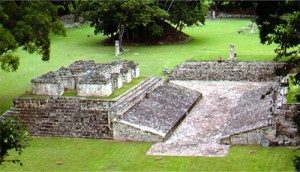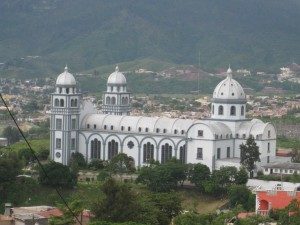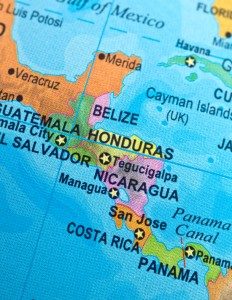 Honduras is a beautiful country located in Central America just south of Guatemala, east of El Salvador, and to the north of Nicaragua with a long expanse of Caribbean coast line on its north side. It is a tropical and mountainous nation with a long rainy season and relatively short dry season.
Honduras is a beautiful country located in Central America just south of Guatemala, east of El Salvador, and to the north of Nicaragua with a long expanse of Caribbean coast line on its north side. It is a tropical and mountainous nation with a long rainy season and relatively short dry season.Honduras has a rich, multi-ethnic pre-history. A great part of that pre-history was the Mayan presence around the city of Copán in western Honduras. This major Mayan city grew and prospered for over 700 years. However, the Mayan civilization had already been in a long decline well before the Spanish came to Honduras in 1502. The Spanish colonized Honduras and all of Central America until their independence on September 15, 1821.
 Due to their Spanish colonization, the official language of Honduras is Spanish, but there are several small indigenous groups that speak their own language. Honduras is traditionally known as a Roman Catholic country; however, the Protestant church or “La Iglesia Evangélica” has been growing and spreading very quickly. In 2008, a CID Gallup poll reported that only 47% of the population identified themselves as Catholic, 36% as evangelical Protestant, and 17% provided no answer or considered themselves “other.”
Due to their Spanish colonization, the official language of Honduras is Spanish, but there are several small indigenous groups that speak their own language. Honduras is traditionally known as a Roman Catholic country; however, the Protestant church or “La Iglesia Evangélica” has been growing and spreading very quickly. In 2008, a CID Gallup poll reported that only 47% of the population identified themselves as Catholic, 36% as evangelical Protestant, and 17% provided no answer or considered themselves “other.”Honduras is the third poorest country in the Western Hemisphere and the second poorest in Central America. Over 70% of the population lives on less than $2.00 per day and 40% of this group live on less than $1.00 per day. The average unemployment rate in Honduras is more than 4.5%, but at least one third of the population is underemployed. The GDP per capita income is $4,700. Despite international and humanitarian aid efforts in the last 30 years, Honduras remains an extremely poor and polarized society where the wealth belongs only to a very small percentage of politicians and business owners.
 One of the most destructive forces in the Honduran society is the extreme violence, delinquency, and theft in the streets. The northern urban city of San Pedro Sula was recently reported as the second most violent city in the world while Tegucigalpa, the capital city, was reported as the seventh most violent city. Central America is currently known as the most violent region in the world, and Honduras, followed by El Salvador, has the second highest homicide rate in the world. Not very long ago Honduras was considered a relatively peaceful nation. However, due to factors such as gang deportation from the USA, extreme corruption and deceit starting in the upper most levels of society, and lack of prevention, investigation and punishment of criminals, in the last 15 years Honduras has become a nation ravaged by violence.
One of the most destructive forces in the Honduran society is the extreme violence, delinquency, and theft in the streets. The northern urban city of San Pedro Sula was recently reported as the second most violent city in the world while Tegucigalpa, the capital city, was reported as the seventh most violent city. Central America is currently known as the most violent region in the world, and Honduras, followed by El Salvador, has the second highest homicide rate in the world. Not very long ago Honduras was considered a relatively peaceful nation. However, due to factors such as gang deportation from the USA, extreme corruption and deceit starting in the upper most levels of society, and lack of prevention, investigation and punishment of criminals, in the last 15 years Honduras has become a nation ravaged by violence.Honduras has a population of over 8.5 million people and almost 90% of the population is mestizo (of mixed European and Native American descent). The population has grown exponentially in the last 20 years, accounting for the fact that 45% of the population is under age 18. Roughly one million Hondurans live abroad, mostly in the USA or Spain. Many are undocumented immigrants who have fled the poverty, violence, and unemployment of their country in search of work and a better life.

